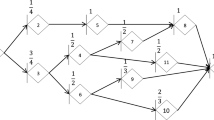Abstract
Project scheduling under uncertainty is a challenging field of research that has attracted increasing attention. While most existing studies only consider the single-mode project scheduling problem under uncertainty, this paper aims to deal with a more realistic model called the stochastic multi-mode resource constrained project scheduling problem with discounted cash flows (S-MRCPSPDCF). In the model, activity durations and costs are given by random variables. The objective is to find an optimal baseline schedule so that the expected net present value (NPV) of cash flows is maximized. To solve the problem, an ant colony system (ACS) based approach is designed. The algorithm dispatches a group of ants to build baseline schedules iteratively using pheromones and an expected discounted cost (EDC) heuristic. Since it is impossible to evaluate the expected NPV directly due to the presence of random variables, the algorithm adopts the Monte Carlo (MC) simulation technique. As the ACS algorithm only uses the best-so-far solution to update pheromone values, it is found that a rough simulation with a small number of random scenarios is enough for evaluation. Thus the computational cost is reduced. Experimental results on 33 instances demonstrate the effectiveness of the proposed model and the ACS approach.
Similar content being viewed by others
Explore related subjects
Discover the latest articles, news and stories from top researchers in related subjects.References
Brucker P, Drexl A, Möhring R, Neumann K, Pesch E. Resource-constrained project scheduling: Notation, classification, models and methods. European Journal of Operational Research, 1999, 112(1): 3–41.
Blazewicz J, Lenstra J K, Rinnooy Kan A H G. Scheduling subject to resource constraints: Classification and complex. Discrete Applied Mathematics, 1983, 5(1): 11–24.
Ödamar L. A genetic algorithm approach to a general category project scheduling problem. IEEE Transactions on Systems, Man, and Cybernetics — Part C: Application and Reviews, 1999, 29(1): 44–59.
Tseng L Y, Chen S C. Two-phase genetic local search algorithm for the multimode resource-constrained project scheduling problem. IEEE Transactions on Evolutionary Computation, 2009, 13(4): 848–857.
Kolisch R. Project Scheduling under Resource Constraints: Efficient Heuristics for Several Problem Classes. Physica-Verlag, 1995.
Russell A H. Cash flows in networks. Management Science, 1970, 16(5): 357–373.
Herroelen W, De Reyck B, Demeulemeester E. Project network models with discounted cash flows: A guided tour through recent developments. European Journal of Operational Research, 1997, 100(1): 97–121.
Ulusoy G. Four payment models for the multi-mode resource constrained project scheduling problem with discounted cash flows. Annals of Operations Research, 2001, 102(1-4): 237–261.
Mika M, Waligóra G, Węglarz J. Simulated annealing and tabu search for multi-mode resource-constrained project scheduling with positive discounted cash flows and different payment models. European Journal of Operational Research, 2005, 164(3): 639–668.
Chen W N, Zhang J, Chung H S H, Huang R Z, Liu O. Optimizing discounted cash flows in project scheduling — An ant colony optimization approach. IEEE Transactions on Systems, Man, and Cybernetics — Part C: Applications and Reviews, 2010, 40(1): 64–77.
Herroelen W, Leus R. Project scheduling under uncertainty: Survey and research potentials. European Journal of Operational Research, 2005, 165(2): 289–306.
Li Z, Ierapetritou M. Process scheduling under uncertainty: Review and challenges. Computers and Chemical Engineering, 2008, 32(4-5): 715–727.
Sahinidis N V. Optimization under uncertainty: State-of-the-art and opportunities. Computers and Chemical Engineering, 2004, 28(6-7): 971–983.
Park H K. Cash flow forecasting in construction project. KSCE Journal of Civil Engineering, 2004, 18(3): 265–271.
Yang I T, Chang C Y. Stochastic resource-constrained scheduling for repetitive construction projects with uncertain supply of resources and funding. International Journal of Project Management, 2005, 23(7): 546–553.
Wu X, Zhou X. Stochastic scheduling to minimize expected maximum lateness. European Journal of Operational Research, 2008, 190(1): 103–115.
Ke H, Liu B. Project scheduling problem with stochastic activity duration times. Applied Mathematics and Computation, 2005, 168(1): 342–353.
Guo Z X, Wong W X, Leung S Y S, Fan J T, Chan S F. Genetic optimization of order scheduling with multiple uncertainties. Expert Systems with Applications, 2008, 35(4): 1788–1801.
Long L D, Ohsato A. Fuzzy critical chain method for project scheduling under resource constraints and uncertainty. International Journal of Project Management, 2008, 26(6): 688–698.
Daniels R L, Carrillo J E. β-robust scheduling for single-machine systems with uncertain processing times. IIE Transactions, 1997, 29(11): 977–985.
Creemers S, Leus R, De Reyck B, Lambrecht M. Project scheduling for maximum NPV with variable activity durations and uncertain activity outcomes. In Proc. IEEE International Conference on Industrial Engineering and Engineering Management, Dec. 2008, pp.183–187.
Creemers S, Leus R, Lambrechts M. Scheduling Markovian PERT networks with maximum-NPV objective. Technical Report KBI 0811, Department of Decision Sciences and Information Management, KU Leuven, Belgium, 2008.
Sobel M J, Szmetekovsky J G, Tilson V. Scheduling projects with stochastic activity duration to maximize expected net present value. European Journal of Operational Research, 2009, 198(3): 697–705.
Wiesemann W, Kuhn D, Rustem B. Maximizing the net present value of a project under uncertainty. European Journal of Operational Research, 2010, 202(2): 356–367.
Szmerekovsky J G. Single machine scheduling under market uncertainty. European Journal of Operational Research, 2007, 177(1): 163–175.
Dorigo M, Maniezzo V, Colorni A. Ant system: Optimization by a colony of cooperating agents. IEEE Transactions on Systems, Man, and Cybernetics — Part B: Cybernetics, 1996, 26(1): 29–41.
Dorigo M, Gambardella L M. Ant colony system: A cooperative learning approach to TSP. IEEE Transactions on Evolutionary Computation, 1997, 1(1): 53–66.
Merkle D, Middendorf M, Schmeck H. Ant colony optimization for resource-constrained project scheduling. IEEE Transactions on Evolutionary Computation, 2002, 6(4): 333–346.
Chen W N, Zhang J. An ant colony optimization approach to a grid workflow scheduling problem with various QoS requirements. IEEE Transactions on Systems, Man, and Cybernetics — Part C:Application and Reviews, 2009, 39(1): 29–43.
Hu X M, Zhang J, Chung H S H, Liu O, Xiao J. An intelligent testing system embedded with an ant colony optimization based test composition method. IEEE Transactions on Systems, Man and Cybernetics — Part C:Application and Reviews, 2009, 39(6): 659–669.
Gutjahr W J. S-ACO: An ant based approach to combinatorial optimization under uncertainty. In Proc. the 4th ANTS, Sept. 2004, pp.238–249.
Gutjahr W J. A converging ACO algorithm for stochastic combinatorial optimization. In Proc. the 2nd Symposium on Stochastic Algorithms, Foundations and Applications, Sept. 2003, pp.10–25.
Balaprakash P. Ant colony optimization under uncertainty. Technical Report No. TR/IRIDIA/2005-028, IRIDIA, Universite Libre de Bruxelles, 2005.
Brucker P, Knust S, Schoo A, Thiele O. A branch and bound algorithm for the resource-constrained project scheduling problem. European Journal of Operational Research, 1998, 107(2): 272–288.
Lee J K, Kim Y D. Search heuristics for resource constrained project scheduling. Journal of the Operational Research Society, 1996, 47(5): 678–689.
Chiang C W, Huang Y Q, Wang W Y. Ant colony optimization with parameter adaptation for multi-mode resource-constrained project scheduling. Journal of Intelligent & Fuzzy Systems: Applications in Engineering and Technology, 2008, 19(4-5): 345–358.
Józefowska J, Mika M, Różycki R, Waligóra G, Węglarz J. Simulated annealing for multi-mode resource-constrained project scheduling. Annals of Operations Research, 2001, 102(1-4): 137–155.
Bianchi L, Dorigo M, Gambardella L M, Gutjahr W J. Meta-heuristics in stochastic combinatorial optimization: A survey. Technical Report IDSIA-08-06, IDSIA, Dalle Molle Institute for Artificial Intelligence, 2006.
Bianchi L, Dorigo M, Gambardella L M, Gutjahr W J. A survey on metaheuristics for combinatorial optimization. Nat. Comput., 2009, 8(2): 239–287.
Jin Y, Branke J. Evolutionary optimization in uncertain environments — A survey. IEEE Transactions on Evolutionary Computation, 2005, 9(3): 303–317.
Vieira G E, Herrmann J W, Lin E. Rescheduling manufacturing systems: A framework of strategies, policies and methods. Journal of Scheduling, 2003, 6(1): 39–62.
Shtub A, Bard J F, Globerson S. Project Scheduling: Processes, Methodologies and Economics (2nd edition). Prentice Hall, 2002.
Kolisch R, Hartmann S. Heuristic algorithms for solving the resource-constrained project scheduling problem: Classification and computational analysis. In Handbook on Recent Advances in Project Scheduling. Weglarz J (ed), Dordrecht, The Netherlands: Kluwer Academic Publishers, 1999, pp.197–212.
Demeulemeester E, Dodin B, Herroelen W. A random activity network generator. Operations Research, 1993, 41(5): 972–980.
Author information
Authors and Affiliations
Corresponding author
Additional information
This work was supported in part by the National Science Fund for Distinguished Young Scholars of China under Grant No. 61125205, the National Natural Science Foundation of China (NSFC) under Grant No. 61070004, NSFC-Guangdong Joint Fund under Key Project No. U0835002.
Electronic Supplementary Material
Below is the link to the electronic supplementary material.
Rights and permissions
About this article
Cite this article
Chen, WN., Zhang, J. Scheduling Multi-Mode Projects under Uncertainty to Optimize Cash Flows: A Monte Carlo Ant Colony System Approach. J. Comput. Sci. Technol. 27, 950–965 (2012). https://doi.org/10.1007/s11390-012-1276-2
Received:
Revised:
Published:
Issue Date:
DOI: https://doi.org/10.1007/s11390-012-1276-2




